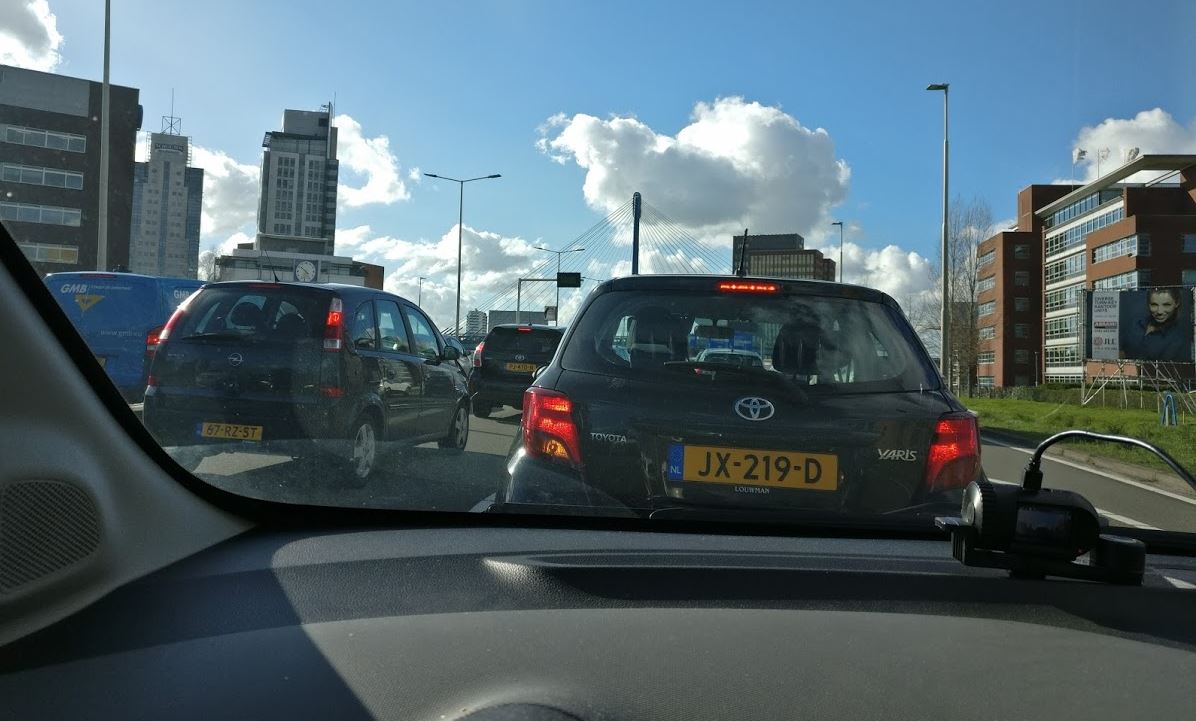People like routine. Routine allows us to be efficient, productive, safe, relaxed, and therefore happy.
But routine can also keep us from being happier.
A lot of people are afraid to try new things in their lives. Why? Because we are generally afraid of change. What would we do if something good changed in our lives? Why would we risk it? Why would we try something new, when the things that we’ve perfected – our routine – is already making us live a good and happy life?
The answer is simple: because you don’t know how happy you could potentially be if you never open up to new things.
This article is about stepping out of your comfort zone because that’s where happiness might be waiting for you. I’ll also take a slight detour to announce how my girlfriend and I are planning on breaking out of our own comfort zones!
Contents
Your comfort zone a.k.a. bubble of happiness
Think of the following metaphor: If you’ve lived your entire life trying to avoid major changes, you’re basically living in a bubble. Let’s call this your bubble of happiness.
It’s safe and warm inside, and you think this bubble is more than big enough. I mean, you have your career which pays the bill, you get to go on 1 or 2 vacations a year, and you have some time at the end of each day to decompress and relax. All things considered, you are pretty damn happy with your bubble.
Now, people often avoid major changes in their lives because they are afraid that once they exit their bubble of happiness, it will be impossible to get back in.
- What if I change careers?
- What if I go back to school?
- What if I take a year off?
- What if I immigrate?
We tend to think of these major changes as if they are permanent exits. Once we embrace these changes, there’s no coming back. The moment we step foot outside our bubble of happiness, it immediately collapses, and there’s no guarantee that our new bubble will ever be as big, warm and comfortable.
But that’s where you are wrong.

Why you should leave your comfort zone
Why?
Because you only know how big your bubble of happiness really is when you actually leave it for a moment.
Without ever trying something new in your life, you’ll never actually get to leave your bubble. Therefore, you’ll never know what else is out there.
Maybe your bubble is actually not that big, warm and comfy after all, and maybe you could have created yourself a much bigger bubble of happiness had you only tried something new a little earlier.
When researching more about this topic, I landed on this article about the most frequent deathbed regrets. It’s a fascinating story that uncovers what most people regret the most as they are near the end of their lives. Here’s the gist of it:
- I wish I’d had the courage to live a life true to myself, not the life others expected of me.
- I wish I hadn’t worked so hard.
- I wish I’d had the courage to express my feelings.
- I wish I had stayed in touch with my friends.
- I wish that I had let myself be happier.
The first thing that strikes me is that this list does NOT include anyone that said: “I wish I didn’t take as many risks as I did” or “I wish I lived a more uneventful life”.
Is your comfort zone a product of yourself or your environment?
Woah. That’s a loaded question.
But it’s important that you think of it. Is your bubble of happiness something that you truly built yourself, or is it a product of your environment, such as your work, family, friends, etc?
I’ll be the first to answer this: my bubble of happiness at the moment is definitely a product of my environment. I mean, here are some things that come to mind that are definitely NOT something I would want in my bubble of happiness:
- I work a fulltime job that I can mostly tolerate but doesn’t make me truly happy.
- I’m forced to wake up early every day.
- Even worse, I have to do my best to go to bed early, or else I’ll feel like a sleep-deprived piece of shit the next morning.
- I spend >1.5 hours a day sitting in traffic, packed like sardines in a crushed tin box (a.k.a. a car).
- My weekend is usually jampacked with the things that I’m not able to do during the week. As a result, I find it harder to enjoy these things, because there’s only so little time.
Still, these things are all a part of my comfort zone. I happily enter my car every morning to go to work, because I know that I’ll be on time in the office and that my manager thinks I’m an okay guy, which will then ensure my salary. This is all part of my routine.
I’ll repeat the question: is your comfort zone a product of yourself or your environment?
Think about it and draw your own conclusions from there.

A perfect example of stepping out of your comfort zone: Taking a sabbatical
I read an interesting thread the other day on the financial independence subreddit. This subreddit is mostly about living frugally now, in order to achieve (financial) freedom later. This is what I’m trying to do as well. I’m trying to save up as much money as possible, without sacrificing my happiness for it. This means that I try to minimize spending money on things that don’t make me happy. Anyway, that’s not the point here.
This thread was about the following dilemma: take a sabbatical (or mini-retirement) now and deplete your life savings, or continue saving and acquire freedom earlier.
Some people provided their opposing opinions, that usually consisted of the following reasons:
- You’ll find it very hard to get employed again when you have a full year of unemployment on your resume.
- Your career has the highest potential to grow when you’re still young. You’re better off investing in your career now since this is the time to shine.
For me, taking a sabbatical is one of the best examples of exiting your bubble of happiness. Why? Because jobs and careers are such a big part of our lives, yet they generally don’t have a positive influence on our happiness. In fact, a lot of people hate their job and only put up with it because they need the money, or they are afraid that they won’t be able to find something better.
Remember, this is one of the biggest regrets of people on their deathbeds!
Why happiness may be outside your comfort zone
If more people stepped out of their bubble, they would be able to re-evaluate what they think is valuable in life. In addition, this will also allow you to revalue their own time. If you read through that Reddit thread, you’ll see lots of people who took a sabbatical while also facing fears of not being able to re-enter their bubble of happiness again. But for most of them, this turned out to be only a good thing.
Because as soon as you make a drastic change to your life – and you exit your bubble – you’ll be able to look back from the outside and see the true size of this bubble, that safe place that you’ve spent years of your life in. What you will probably find out is that your bubble could have been much bigger this whole time, if only you had exited earlier.
Now, most people that share their experiences of taking a sabbatical are wildly positive. But could that be a result of survivorship bias? Possibly, yes. I’m fully aware of that.
But I’m still going to do it.

I’m stepping out of my comfort zone
I’m taking a sabbatical.
Wait… what?
YES! I might as well announce it right here, in this fitting post that’s about drastic changes and leaving your comfort zone in order to become happier.
My girlfriend and I are taking a sabbatical at the end of 2020. This is a huuuuuge step out of our bubbles of happiness, but we are super excited for this step.
What does this mean?
- We have to resign from our (cushy) jobs.
- We have to leave our apartment (so we’ll be basically homeless).
- We’ll put our relationship to the test since we’ll be traveling together pretty much 24/7 (we’ve obviously never done this before).
- We’ll be left with no income for a year, and no guarantee of a job on return.
These are the things that we’re afraid of, a.k.a. the scary things that our bubble of happiness protects us from.
But why are we still going to pull through?
- Because YOLO
Wait, that’s it?
Surely, I must have a better explanation? Well, yes and no. It all comes down to YOLO, as cringe-y as that may sound.
You only live once
We want to spend the best years of our life together doing the things that WE want to do. Not the things that others (like our employers) want us to do. This feeling is especially strong for me right now as I’m spending 99% of my time thinking about work in the most stressful environment I’ve ever been in.
Sure, there are many things that can go wrong.
- What if we are unlucky and our savings run dry within months?
- What if one of us becomes sick?
- What if our relationship explodes within a week?
These are all things that would normally keep a person inside his/her bubble of happiness. Safely tucked away from uncertainties, risks, and hidden dangers.
But as I said before, that is simply a mistake.
Because the truth is:
- We’ve been saving money for a long time already, and have carefully planned this.
- We are still young, and losing a year of career development is not the end of the world. In fact, a lot of people our age are just now finishing university, and they all turn out fine! And even then, no one is able to predict the future. A lot of people invest heavily in a certain career or degree only to get pushed out when a market crashes.
- Yes, our relationship might also crash, but that’s always a possibility anyway, whether we’re at home or not.
- Yes, we may get sick, but again, that’s always possible, even when you’re safely tucked away in your bubble of happiness.
But the biggest fact remains: nobody on their deathbed has ever regretted the risks they’ve taken. Instead, it’s the times that you didn’t take a chance that you regret the most!
You only live once. Again, this is what it all comes down to.
A lot of people that – at some point – decided to travel the world have some form of passive income. These people usually refer to themselves as digital nomads, and while this idea is awesome, this term is slowly being abused by people who just want to sell you the idea of a free lifestyle. We’re not one of these people. This website – Tracking Happiness – has made me just $20 last month. That’s just enough to cover 3 happy meals or pay for my web hosting. Chose one. My girlfriend and I have not won a lottery, have not invested in Bitcoin, and are definitely not financially independent.
What I’m saying is that this big step is indeed FAR outside my bubble of happiness. We are not financially secure (even though we have a “Fuck You” fund), and I am still not sure what money we’ll have left when we’re finished. The point here is that we’re not letting that stop us from exiting our bubble. We want to try to expand our happiness!
Anyway, what’s our plan?
Here it is, in a nutshell: our plan is to travel to the USA and Canada and road trip/van dwell for an entire year. We haven’t told this to anyone at our jobs yet since we don’t want to let this hurt our remaining year of work. Either way, more details will follow later (maybe).
What if everybody stepped outside of their comfort zone?
This is a small sidestep, but a shower thought that I wanted to share.
What if everybody said “screw it” and did the things they are actually passionate about, instead of being locked up in an office 40 hours a week?
Why am I using work as yet another example? Because this is hugely relevant in the society that we’re in, where companies are always competing, growing and trying to be the very best (a.k.a. capitalism).
In the world of capitalism, companies are incentivized to pay you and me (the workers) as little as possible, while still giving us the idea that we should be happy to work for them.
Now, this is where the bubble of happiness begins for a lot of people.
Sure, we wouldn’t do this job if we weren’t paid for it, but it is a means to an end. I can tolerate this job for now, because I will eventually be able to retire/get promoted/win the lottery/etc. If this is you, you might be pretty comfortable in your bubble, but you have no idea how big and comfortable that bubble really is. In fact, your bubble is definitely a product of your environment at this point!
What if everybody jumped ship, exited their bubbles of happiness, and went on to do exactly what they wanted in their lives?
At first? Crisis, surely. Both your personal finances and the economy would take a hit since the wheels of capitalism would just stop turning for a moment.
But after a while? The balance would be restored.
See, everything is in a delicate balance where the bid meets the offer. This is called an equilibrium. You are paid your salary (the bid) because you put in 40 hours of work every week (the offer). If you leave your job, then someone else would replace you, most likely for a higher salary. Why? Because the offer just decreased, so the bid has to increase in order to meet an equilibrium. This is the concept of price and demand.
So if everybody quits their job, then those jobs would only become more valuable, up to a point where salaries will increase. These salaries will eventually reach a point where you’ll again feel like it’s a fair deal between your time (the offer) and the money you get paid (the bid).
A lot of companies are perfectly aware of this, but try to keep this simple knowledge from their workers. You see, the longer you stay in your seemingly comfortable bubble, the more your company is able to benefit from you.
Do you feel comfortable in your bubble of happiness?
If there is a call to action to this post, it’s definitely not to stand up and quit your job right away. You should probably not do that.
What I want you to do, however, is to answer these questions:
- When was the last time you really got out of your comfort zone? (I’m talking about moving abroad, having a first child, ending a bad relationship, quitting your job, etc).
- Is your bubble of happiness a product of yourself or your surroundings?
- Without comparing yourself to others(!), are you happy with your current bubble of happiness? Do you think it could be bigger?
- If yes, then what’s the first step you can think of that will make you leave your bubble of happiness?
Exiting your bubble of happiness is always scary. Thinking about it might already give you anxiety. But still, it’s a good idea to think bigger. If you want to be happier, you might have to exit your comfort zone in order to find it.
Be brave. Be bold. Create your own bubble of happiness and don’t be afraid to exit it every once in a while.
Choose happiness.
💡 By the way: If you want to start feeling better and more productive, I’ve condensed the information of 100’s of our articles into a 10-step mental health cheat sheet here. 👇
This Cheat Sheet Will Help You Be Happier and More Productive
Thrive under stress and crush your goals with these 10 unique tips for your mental health.
Closing words
This is probably not the article that you expected. Hell, it’s not even the article that I expected to write.
I’d love to know your answers to the questions in this article. When was the last time you stepped out of your comfort zone? How did that influence your happiness in the long run? Let me know what you think, what you liked, what you hated, or just say hello in the comments below!


